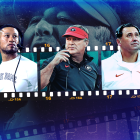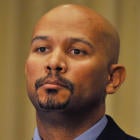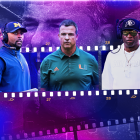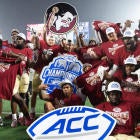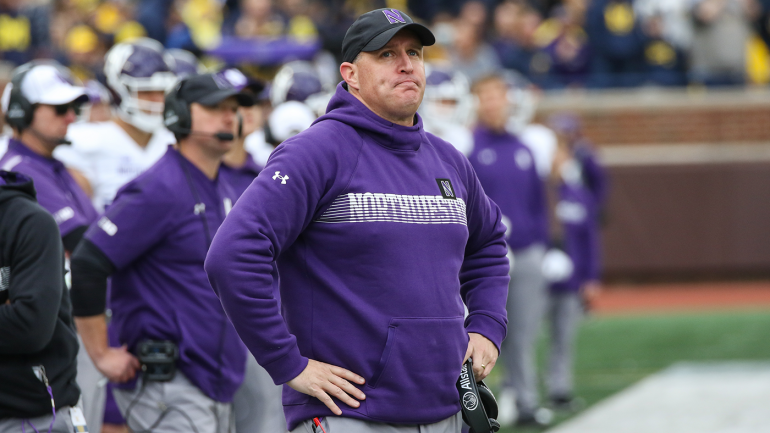
Football's meathead culture still exists -- even at one of the nation's most prestigious institutions. That was obvious through the weekend culminating with the firing of Northwestern coach Pat Fitzgerald on Monday.
What was once accepted -- and thought since to be rejected -- still endures today. That, of course, is tragic. The only difference is the level of surprise across the 20th and 21st centuries. Apparently, we haven't come too far.
Green Bay Packers lineman Jerry Kramer wrote a best-selling book in 1968 about how the great Vince Lombardi drove his players to the edge to win championships.
Fitzgerald didn't have the romanticized chasing of championships as a (poor) excuse. Northwestern punched above its weight playing for the Big Ten title twice since 2018. It also fell to 4-20 over the last two seasons. And then what was going on behind the scenes came to light in what should be the enlightened year of 2023.
Abuse is abuse and Northwestern's former coach allegedly oversaw a program in which hazing was normalized. Within that culture, young players were supposedly "dry humped" in the dark by upperclassmen. A naked center snapped the ball to a naked quarterback proving ... what, exactly?
Certainly not that manly men were shaped by the experience. The conclusion is that, incredibly, the default setting for some coaches a quarter century into the 21st century remains that figurative sledgehammer: beat up players enough and they are become motivated enough.
The difference being that, until now, we thought we were left with only those romanticized versions of hazing. Remember Junction Boys, the so-called "survivors" of Bear Bryant's preseason camp at Texas A&M? Frank Kush was a molder of men at Arizona State until it was discovered his tactics were way over the line.
Forty-four years ago, a Sun Devils punter filed a $1.1 million suit alleging, among other abuses, Kush had punched him in the mouth. A month later, Kush was fired for interfering with the school's investigation of the incident. That was during the Reagan administration. In 1978, Woody Hayes was fired at Ohio State and perpetuated a culture by punching Clemson's Charlie Bauman.
Monday was a reminder that default setting still exists at all levels. Miami Dolphins offensive lineman Richie Incognito was suspended in 2014 after he and other players viciously taunted teammate Jonathan Martin.
What happened at Northwestern wasn't a Penn State or a Baylor, but it was a systemic cultural issue and a moral failing.
Former Penn State defensive coordinator Jerry Sandusky was convicted of abusing young boys. The reputations of Joe Paterno and several of his assistants were dragged into the mud, the implication being they should have known even if they did not. A sexual abuse scandal cost Art Briles his job at Baylor. More recently, allegations of racism didn't cost coach Iowa coach Kirk Ferentz anything. Ferentz is one of the game's few coaches with a longer tenure (entering Year 25) than the one Fitzgerald held with the Wildcats (17 years).
What happened at Northwestern was not only unnecessary, it was preventable. There were clearly warning signs at a minimum. In every case, the meathead culture prevailed.
At best, Fitzgerald did not know about the hazing despite stewarding the program for nearly two decades. There are reports that a whiteboard in the locker room detailed planned hazing, but Northwestern cannot find evidence the coach was aware of the abuse. Still, citing an independent investigation into the hazing allegations, Northwestern president Michael Schill admitted Monday that 11 players corroborated such incidents.
It remains a dereliction of duty that Schill admitted to "only recently" learning of many of the details. In an investigation this significant, a university president had to be monitoring the progress daily. Schill did not. Worse yet, he was scooped by The Daily Northwestern student newspaper, which published accounts over the weekend that -- let's face it -- ultimately got Fitzgerald fired.
On Friday, Schill suspended Fitzgerald for two weeks without pay. In a statement Monday following his dismissal, the coach revealed that was a mutually agreed upon punishment.
Northwestern, a private school, refuses to release the details of the independent investigation. That must change if there is ever going to be closure.
Fitzgerald, a College Football Hall of Fame linebacker for the Wildcats and 2018 Big Ten Coach of the Year who led Northwestern to its greatest on-field successes, remains a legend at the school. Schill remains a largely unknown academic who might have screwed up both the investigation and its penalties.
Apparently, there was additional information that Schill and the trustees either failed to learn or failed to act upon following a six-month investigation. Either way, they are implicated in a different way.
If Fitzgerald didn't know of the abuses, he certainly should have. If the Northwestern administration knew 11 players corroborated hazing claims yet concluded that a two-week suspension was enough on Friday, what changed Monday?
Someone beyond Fitzgerald dropped the ball, and he will not walk away from Northwestern without demanding a boatload of cash if he was fired with cause as that "cause" seemingly did not exist for the university as of a few days ago.
Fitzgerald released a statement late Monday stating his agent and lawyer would "take necessary states to protect my rights in accordance with the law."
Hello, lawsuit. Goodbye, resolution.
Players were complaining Monday night that Schill and athletic director Derrick Gragg "didn't even have the balls" to either address them in person or take questions on Zoom following the announcement of Fitzgerald's departure.
Whether Fitzgerald coaches again is hardly the main question. That is whether football will finally, ultimately move out of the dark ages past the meathead culture that still clearly permeates the game.














